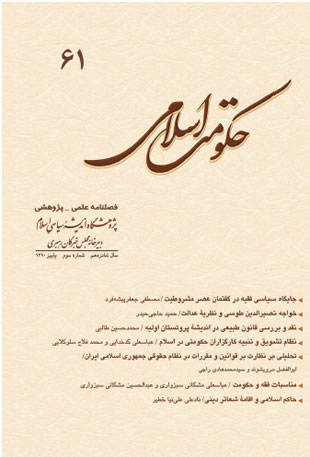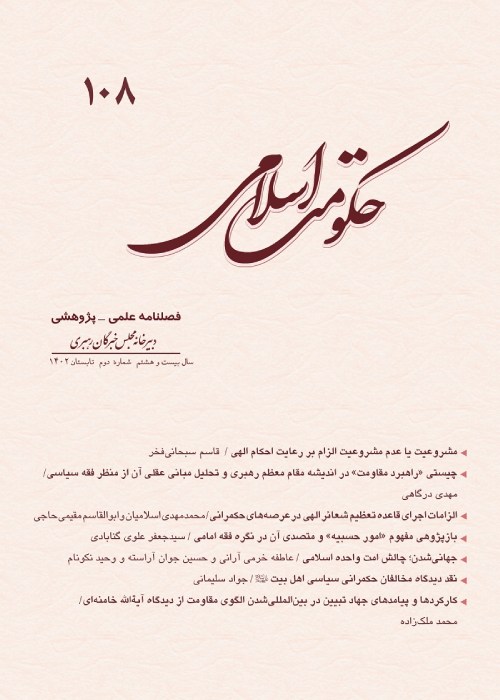فهرست مطالب

نشریه حکومت اسلامی
سال شانزدهم شماره 3 (پیاپی 61، پاییز 1390)
- ویژه اندیشه و فقه سیاسی اسلام
- 208 صفحه، بهای روی جلد: 15,000ريال
- تاریخ انتشار: 1390/09/30
- تعداد عناوین: 8
-
-
صفحه 5پیرامون نهضت مشروطیت ایران، سوالهای اساسی و مهمی وجود داشته است؛ همچنان که اکنون نیز محل بحث و گفت وگو می باشد. یکی از مباحث محوری این مساله، مشخص کردن جایگاه سیاسی فقیه در گفتمان دوره مشروطیت است. پیشقراولان مشروطه و تاثیرگذاران در این نهضت؛ اعم از موافقان و مخالفان، در مورد جایگاه سیاسی فقیه چه اندیشه ای داشته اند؟ آیا مساله ولایت فقیه و ش وون سیاسی او از موضوعا ت مورد اختلاف میان موافقان و مخالفان مشروطه بوده است؟ آیا حداقل درخطوط کلی این مساله هر دو گروه، به یک گونه می اندیشیده اند؟ به تعبیر دیگر، اگر محقق و پژوهشگری منصف، فهرست و لیستی از عناوین مورد بحث در گفتمان مشروطیت را جمع آوری کند همچون مساله آزادی، عدالت، مساوات، رای اکثریت، مجلس، استبداد، جهاد، غرب ستیزی و تمدن آیا مساله شوون فقیه از مسائل مورد اختلاف میان مشروط هطلبان و مخالفان آن بوده است تا اینکه در این لیست جای بگیرد یا اینکه این مساله، جزء اصول کلی و مبانی مورد پذیرش هر دو دسته محسوب شده است؟
کلیدواژگان: جایگاه سیاسی فقیه، مشروطیت، مخالفان مشروطه، موافقان مشروطه، مشروعیت -
صفحه 133
-
صفحه 163
-
صفحه 191
-
Page 5Key questions have been raised about Iran's constitutional movement, which are also a subject of inquiry and speculation today. One of these questions is about defining the political status of faqih in the discourse of the constitutional movement era. Some other questions are worth considering such as: what do the vanguards and activists of the constituonal movement including opponents and proponents think about the political status of faqih? Do the opponents and proponents of the constitutional movement have different views about the idea of guardianship of jurist and his political affairs? Have these two sides ever thought of the general outlines of this topic in one way or another?In other words, if a just researcher compiles an index or list of the discussions on the discourse of constitutional movement; for example, freedom, justice, equality, majority vote, parliament, despotism, jihād (holy war), anti-western position and civilization, will the question of guardianship of jurist be among the questions over which the opponents and proponents of constitutionalism have different positions so that it will be included in the list, or else this question is cousidered as part of thegeneral principles which both sides accept?
-
Page 35This article discusses Khwājah Nasir al-Dīn al-Tūsī's political theory as a theory of justice. His theory takes form through different steps. He proposes man's capability of perfection as the first step. In the second step the fact that human perfection can be achieved in a collective life is proposed. In the third step he points to the natural state of human society which is full of struggle and corruption. Advancing an argument, Khwājah Nasir al-Dīn explains in the fourth step that social life needs principles of justice to settle the problems of struggle and natural corruption. In the fifth step he regards that the establishment of a government and having political authority aims at dispensing justice. In the sixth step he argues that a good government is a religious government which is governed by a prophet, an infallible Imam or a fiqih who enjoys all the qualifications. In this step, along with the principle of guardianship, he proposes the necessity of maintaining a balance between various social forces by the chief of the city, and formulates his own political theory on the basis of social justice as Plato and John Rawls did.
-
Page 59Given that there is no historical record of the studies relating natural law in the works of Muslim thinkers and for the sake of developing a theory and making scientific advances about exploring the basic principles of natural law in Islam, it is necessary to make a thorough study of the doctrine of natural law in the West in general and in the Protestant era in particular. The reason is because in that period of the history of the West, the Protestant thinkers, who were devoted to religious criteria, sought to preserve the achievements of the Chrisian natural law against the attack by the new generation of thinkers on philosophical religious teachings. The vigorous attack of humanism on the doctrine of natural law in that period led Grotius to introduce an explanation of this law, which was, according to a large number of thinkers, based on secular thoughts. In spite of the efforts made by Pufendorf to remove the idea of secular interpretation from the content of natural law, his efforts were not quite successful. This article first expounds natural law in the early Protestant era, and then underlines the shortcomings in the explanation of those who proposed this theory. These shortcomings leveled at the theorists critical remarks are divided in to two separate groups: common criticisms including one critical point raised against all those who proposed the theory of natural law in the early Portestant era, and special criticisms containing five critical points which shed light on the shortcomings in the views of each of these thinkers.
-
Page 79The encouragement and punishment system is one of the most important factors which guarantee managers and worker's success in developing their programs and making the changes which they are after. Adopting suitable methods of encouragement and punishment has a great effect on motivating the workers to carry out the duties assigned to them and preventing committing offences. Adopting inefficient methods of encouragement and punishment cannot contribute to achieving the goals of an organization or an office as well as expected, and has negative effects and undesirable consequences as well. Due to the the importance of the use of encouragement and punishment, first it should be pointed out that Islam has given special attention to the principle of encouraging and punishing governmental officials and, in some cases, basic strategies and general methods of encouragement and punishment were presented in order to avoid possible mistakes and decrease of efficiency. In addition to its presenting efficient methods of encouraging and punishing governmental officials, Islam gives special importance and attention to the idea of ensuring the accomplishment of them in this world and the next. During the period of his leadership which did not last long, Imam Ali (a) presented an absolutely ideal example of encouragement and punishment of officials. Considering the attention which Islam gives to the rule of encouragement and punishment and the guarantee of applying it, this rule can be proposed to the managers as a clear way for the success and high efficiency of offices and organization.
-
Analysis of Supervising the Rules and Regulation in the Legal System of the Islamic Republic of IranPage 103The base for establishing the Islamic Republic is the governance of the Law or Shari‘ah over all the affairs of country including legislation. Therefore, the constitution has provided some mechanisms, the most important of which is the formation of the Guardian Council. Along with this, there are such things like the basis of supervising laws and the way this supervision functins, the authority on which this issue is based and other questions, some of which have not explicitly predicted by the institution, for example, the Expediency Council and the way of supervising the laws approved by the Islamic Consultative Asssmbly (Majlis). But, some of these questions are not found in the constitution or ordinary laws, as in the case of the way of supervising the sanctioned laws of the whole authorities other than the Majlis. The present article investingates the different legal questions which can be raised about the Shar‘i supervision of rules and regulations.
-
Page 133The scope of Shi’i Fiqh and the extent to which it is related to government is one of the issues, the treatment of which can resolve many doubts and provide a clear image of Shi’i fiqh. In fact, the relations between Shi’i fiqh and government should be recognized by delving into fiqhi subjects and questions. This article, seeking to discuss some issues and subjects which fall within the domain of fiqh as a science, provides us with clear understanding of the relations between fiqhi issues and government. For, to put a group of fiqhi issues into practice, certain form of government is needed. To put other certain fiqhi issues into practice also raises the issue of government. And, the third set of fiqhi issues are those related to personal affairs which prove the need for a government that can carefully supervise the implementation of fiqhi issues
-
Page 163Sha‘āyer (rituals) is the plural form of sha‘ira or shi‘ār; meaning an external sign or indication. The decree of performing rituals solemnly and their necessity is originated in the Quranic verse 32, Surah Hajj; for the main purpose of attending to it reminds people of God and divine religion. It is incumbent on Islamic government to give special attention to performing religious rituals with great dignity, no matter whether the primary judgement on their dignity is obligatory or recommended. There are many Quranic verses and narrations which confirm the necessity of performing rituals solemnly. Therefore, Muslim faqihs from different schools of thought admit that it is necessary for a Muslim ruler to show great respect to religious rituals. Stressing the importance of the significant obligation of enjoining good and forbidding evil, the holy Quran considers this obligation as a duty of a particular group of people who naturally have considerable power, and Islamic government is a definite testimony to this group. The speech given by Imam Ali (a) at the early days of his appointment as a guardian of the people is a clear evidence for the necessity of giving great attention to divine rituals. This question is so important that most faqihs consider the principle of hajj ritual and paying homage to the Prophet by visiting his grave as a sufficient duty (wajib kifa‘ī) in spite of its being a primary judgement. Consquently, the contemporary supreme religious ruler, Imam Khomeini, confirms the idea of performing religious rituals with dignity as he states: "We have staged the revolution in order to revive Islamic rituals. ''


